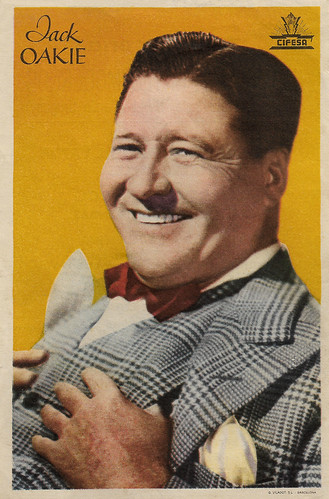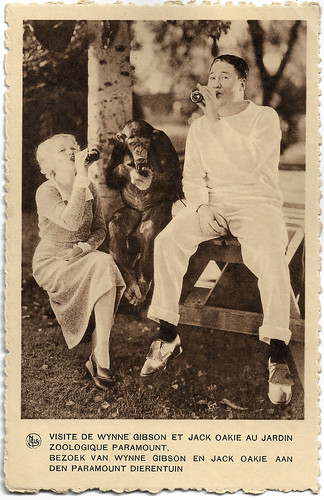
German postcard by Ross Verlag, no. 5145/1, 1930-1931. Photo: Paramount Pictures.

Spanish collector card by I.G. Viladot, Barcelona. Image: Cifesa.
From Broadway to Vaudeville to Hollywood
Jack Oakie was born Lewis Delaney Offield in 1903, in Sedalia, Missouri. His father was a grain dealer, and his mother was a psychology teacher. When he was 5, the Offield family moved to Muskogee, Oklahoma, the source of his "Oakie" nickname.
Oakie spent part of his boyhood in Kansas City with his grandmother and attended Woodland School. He sold papers for the Kansas City Star: He later recalled that he made good money selling “extras” on the night Woodrow Wilson was reelected as president in 1916. Oakie worked as a runner on Wall Street and narrowly escaped being killed in the Wall Street bombing of 16 September 1920.
While in New York, he also started appearing in amateur theatre as a mimic and a comedian. In 1923 Oakie landed a job as a chorus boy in George M. Cohan’s 'Little Nelly Kelly' on Broadway.
He went from Broadway to vaudeville, with Lulu McConnell as his partner. From there he found employment in several comedies, as well as musicals throughout the mid to late 1920s These included 'Sharlee' (1923), the revues 'Innocent Eyes' (1924) and 'Artists and Models' (1925), and the musical 'Peggy-Ann' (1926).
In 1927 Oakie went to Hollywood, and he was cast as a comedian in his first silent film, Finders Keepers (Wesley Ruggles, 1927) starring Laura La Plante. He also appeared in the silent films The Fleet's In (Malcolm St. Clair, 1928) starring Clara Bow and the Western Sin Town (J. Gordon Cooper, William K. Howard, 1929).

German postcard by Ross Verlag, no. 5161/1, 1930-1931. Photo: Radio. Jack Oakie and Polly Walker in Hit the Deck (Luther Reed, 1929).

German postcard by Ross Verlag, no. 5749/1, 1930-1931. Photo: Paramount. Jack Oakie, Clara Bow and Maurice Chevalier in Paramount on Parade (Dorothy Arzner a.o., 1930).
The World's Oldest Freshman
With the advent of sound, Jack Oakie signed a contract with Paramount. His first talkie was The Dummy (Robert Milton, Louis J. Gasnier, 1929) starring Ruth Chatterton and Fredric March.
Jack went on to support Wallace Beery in Chinatown Nights (William A. Wellman, 1929), Dorothy Mackaill in Hard to Get (William Beaudine, 1929) and Betty Compson in Street Girl (Wesley Ruggles, 1929).
Settling in, he never returned to the Broadway stage. With Nancy Carroll, he played in the musical Sweetie (Frank Tuttle, 1929). He appeared in many of the big musicals of the day with Bing Crosby, Maurice Chevalier and Alice Faye. He was a brush salesman turned Olympic scout in the hilarious screwball farce Million Dollar Legs (Edward F. Cline, 1932) and an unwilling gangster in Dancers in the Dark (David Burton, 1932) opposite Miriam Hopkins.
He played Tweedledum to Roscoe Karns' Tweedledee in the all-star version of Alice in Wonderland (Norman Z. McLeod, Hugh Harman, Rudolf Ising, 1933). In Too Much Harmony (A. Edward Sutherland, 1933), the part of Oakie's on-screen mother was played by his real mother, Mary Evelyn Offield.
During the 1930s, he was known as "The World's Oldest Freshman", as a result of appearing in such collegiate films as The Wild Party (Dorothy Arzner, 1929), Sweetie (Frank Tuttle, 1929), Touchdown! (Norman Z. McLeod, 1931), College Humor (Wesley Ruggles, 1933), College Rhythm (Norman Taurog, 1934) and Collegiate (Ralph Murphy, 1935). Oakie's contract with Paramount ended in 1934 and he continued as a freelancing agent. Not being limited by a film studio contract, Oakie branched into radio and had his radio show between 1936 and 1938.

Spanish postcard in the Series Estrellas del Cine, no. 135. Photo: Paramount Film.

Belgian postcard by Nels for Chocolat Martougin. Photo: Photo Actualit, Brux. Caption: Wynne Gibson and Jack Oakie visit the Paramount Zoo.
Napolini, Il Duce of Bacteria
Jack Oakie's role as Napolini, Il Duce of Bacteria in Chaplin's The Great Dictator (Charles Chaplin, 1940), was a brilliant and very thinly disguised slam at Mussolini. It earned Oakie his only Oscar nomination, for Best Supporting Actor. It was the highlight of his career.
He followed it with supporting parts in bright, silly and feather-light films such as Tin Pan Alley (Walter Lang, 1940), Hello, Frisco, Hello (H. Bruce Humberstone, 1943), and Sweet and Low-Down (Archie Mayo, 1944), with Linda Darnell and Benny Goodman.
Jack's last high-profile films were the Betty Grable musical When My Baby Smiles at Me (Walter Lang, 1948) and the fast-moving gangster film Thieves Highway (Jules Dassin, 1949). In his later years, Oakie made some television appearances in episodes of such television shows as The Real McCoys (1963), Daniel Boone (1966), and Bonanza (1966).
He also turned up in films from time to time, including a cameo in Around the World in 80 Days (Michael Anderson, John Farrow, 1956) and roles in The Wonderful Country (Robert Parrish, 1958), Debbie Reynolds' The Rat Race (Robert Mulligan, 1960) and the comedy Lover Come Back (Delbert Mann, 1961) with Doris Day and Rock Hudson. It was his final film.
Jack Oakie lived in baronial style on a ten-acre estate in Northridge, at the northern end of the San Fernando Valley. His first marriage (1936-1945) was to Venita Varden, who perished in the 1948 air crash of United Airlines Flight 624 at Mount Carmel, Pennsylvania. Oakie's second marriage was to actress Victoria Horne in 1950. They moved to an estate in Northridge and lived there until his death. He died in 1978, at the age of seventy-four. Jack Oakie was married twice. His remains were interred at Forest Lawn Memorial Park, in the Los Angeles area.

British postcard in the Picturegoer Series, London, no, 463.

British Real Photograph postcard, no. 143. Photo: Paramount Pictures.
Sources: Eve Golden (Classic Images), Arthur F. McClure (Missouri Encyclopedia), Wikipedia and IMDb.
1 comment:
As a child, I found him kind of funny.
Post a Comment